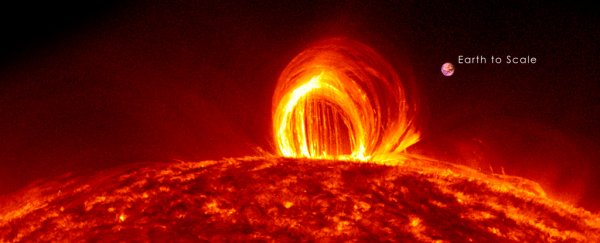New research suggests that our Sun is capable of releasing huge superflares 1,000 times more powerful than anything we've ever seen – and if one was aimed towards Earth, it would have disastrous consequences.
But don't panic, because scientists have also found that while the Sun has the potential to produce a superflare, the pattern of its solar activity makes it very unlikely that it will.
"If the Sun were to produce a superflare it would be disastrous for life on Earth; our GPS and radio communication systems could be severely disrupted and there could be large scale power blackouts as a result of strong electrical currents being induced in power grids," said lead researcher Chloë Purgh from the University of Warwick in the UK.
"Fortunately, the conditions needed for a superflare are extremely unlikely to occur on the Sun, based on previous observations of solar activity."
Solar flares occur when a build up of magnetic energy is suddenly released, and our Sun produces them pretty regularly, with the odd flare interfering with our GPS satellites or communications.
But superflares are a whole other ball game. While we've never experienced one in our Solar System, researchers have observed them in other parts of the galaxy, and they're thousands of times more powerful than the solar flares our Sun puts out.
To put it into perspective, our Sun's normal solar flares can release energy equivalent to 100 million megaton bombs, which is pretty impressive, and has the ability to mess around with our communication systems. But superflares can release the equivalent of a terrifying 1 billion megaton bombs.
To try to figure out what causes these superflares, and whether we might be at risk of experiencing one, the researchers looked at a binary star in the Milky Way called KIC9655129.
Using data from NASA's Kepler space telescope, they were able to detect wave patterns in the star that led up to the flare. They found that the physics that cause solar flares on the Sun are the same as those that produce giant superflares on KIC9655129.
"Solar flares are commonly observed to consist of a series of regularly occurring pulses. Often these pulsations resemble waves, with a wavelength that relates to various properties of the region of the sun that is producing the flare," said Purgh.
"Occasionally, solar flares contain multiple waves superimposed on top of one another, which can easily be explained by coronal seismology. We have found evidence for multiple waves, or multiple periodicities, in a stellar superflare, and the properties of these waves are consistent with those that occur in solar flares."
"This result is, therefore, an indication that the same physical processes are involved in both solar flares and stellar superflares [and] supports the hypothesis that the Sun is able to produce a potentially devastating superflare," she added.
But even though the Sun has the potential to produce a superflare, that doesn't mean that it's likely to, seeing as the solar activity is completely different.
So don't worry, life as we know it on Earth is safe for now. And if it makes you feel any better, the White House has a plan in place in case a large solar flare does hit us anytime soon.
The research has been published in Astrophysical Journal Letters.
